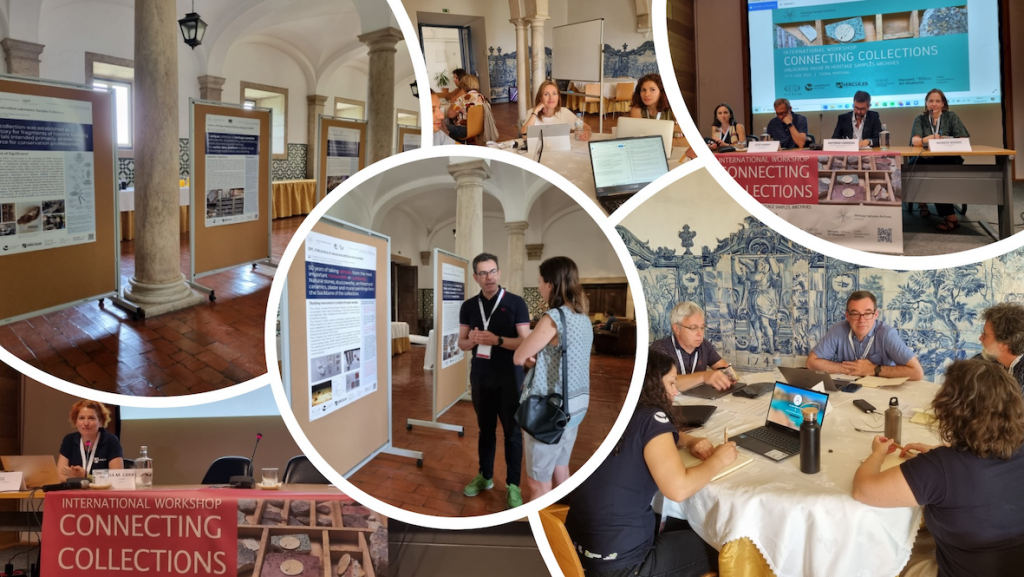For over a century, conservation knowledge has been supported by scientific investigations – informing our understanding of our material past and helping us find new ways to conserve it. Much of this research relies on heritage samples taken from cultural objects, reference collections and replicas. Over the years, the volume of heritage science research has increased dramatically, with hundreds of research and educational institutions worldwide contributing new material studies each year, generating more and more samples. Yet, what happens to these samples after they are collected and analyzed, and who retains responsibility for them? This is often not entirely clear, with many institutions lacking policies, processes and resources to manage this ever-growing concern.
Herein lies a fundamental issue for heritage research: if cultural objects are non-renewable, then surely so too are the samples extracted from them. At a time when sustainability is at the forefront of heritage discussions, it is evident that these principles should also be applied to research. Heritage samples should not be viewed as disposable – use them once and throw them away. However, to preference re-using over retaking samples, our duty of care to preserve these archival documents as a resource for future research must be recognized.

In the two years since ICCROM launched the Heritage Samples Archives Initiative (HSAI), we have joined forces with 26 institutions to raise awareness about this issue, improve management practices and promote access and use. June 2022 was an important moment in the life of this initiative, when partners were able for the first time to meet in person in Évora, Portugal, at the International Workshop on “Connecting Collections: Unlocking Value in Heritage Samples Archives.” This event was jointly organized by ICCROM, the HERCULES Laboratory - University of Évora, the Dresden University of Fine Arts, the Getty Conservation Institute and the Straus Center for Conservation and Technical Studies, Harvard Art Museums.
The workshop provided a platform to highlight the existence and value of heritage samples archives and their specific challenges. Indeed, it is the hope of this initiative that heritage samples will cease to be a forgotten skeleton in the cupboard of conservation research but instead are recognized and cared for appropriately – the knowledge they hold may be precious but is only of value if we can access, share and apply it.
Topics discussed
Day 1: Understanding the value of heritage samples archives
(Recording day 1)
After the welcome address, the findings of an international survey undertaken by ICCROM on heritage samples archives were presented alongside the work of our Heritage Samples Archives Initiative (HSAI) and the Mora Samples Archive project. The Parallel Working Group Sessions of the day focused on defining heritage sample archives and communicating their value and significance for studying cultural and natural heritage. A poster session dedicated to the Value and Significance of Heritage Samples Archives was inaugurated at the University of Évora. The posters highlighted the diversity and value of samples archives by showcasing the holdings of 13 institutions in Brazil, Germany, India, Italy, Portugal, Spain, Switzerland and the United States.
In addition, a series of interviews were conducted with workshop participants about their work with heritage samples archives and their perspectives on their challenges.
Day 2: Exploring archival management best practices
(Recording part 1- part 2)
As highlighted by the survey, samples archives are often inadequately organized and managed, reducing their potential value and function. Day 2’s Parallel Working Group Sessions focused on exploring ways to improve archival management and preservation and user access to these resources, as well as the fundamental ethical principles that govern these activities, including the taking of samples.
Day 3: Enhancing the use of heritage samples archives
(Recording part 1- part 2)
The day started with a roundtable discussion on Communicating Value, Enhancing Use, followed by Parallel Working Group Sessions exploring ways to enhance the use of samples archives through awareness raising and unlocking the information they contain to stimulate new research collaborations. A future outreach strategy for the HSAI was also discussed and included the following suggestions:
- Extend the current partnership and build a user community;
- Link to other communities with samples archives (forensics, biosciences, environmental sciences) to learn and share best practices;
- Produce and publish guidance and information documents to support best practices and raise awareness;
- Provide training for early career and emerging professionals to help them engage with and promote the use of sample archives;
- Organize further workshops on different themes.
Closing remarks
The duty of care that heritage institutions and professionals have to heritage samples archives must be recognized to preserve these unique evidential resources so that they can provide new insights that deepen our understanding of our shared cultural heritage and help us find better ways to conserve it.
To deliver on this obligation, the following recommendations are made:
- Each heritage samples archive should be recognized by its custodial institution as a cultural heritage asset, with a commitment to care and long-term preservation.
- There should be common recognition of the responsibilities involved in collecting and managing heritage samples archives as an essential part of responsible research; new samples should be collected responsibly and ethically.
- Samples archives should be managed by designated individuals who have the relevant skills to do this job properly.
- A specific budget and resources should be allocated to samples archives to allow their proper management.
- Basic standards of archival management for heritage samples archives should be met.
- Long-term preservation strategies for heritage samples archives should be established.
- Heritage samples archives should be digitized and shared so that information can be accessed, ideally through a sustainable online shared platform – a repository for knowledge and access.
- As a first step towards integrating and sharing data, all custodial organizations are encouraged to register their samples archives on the ICCROM Register, which will be launched in 2023.
